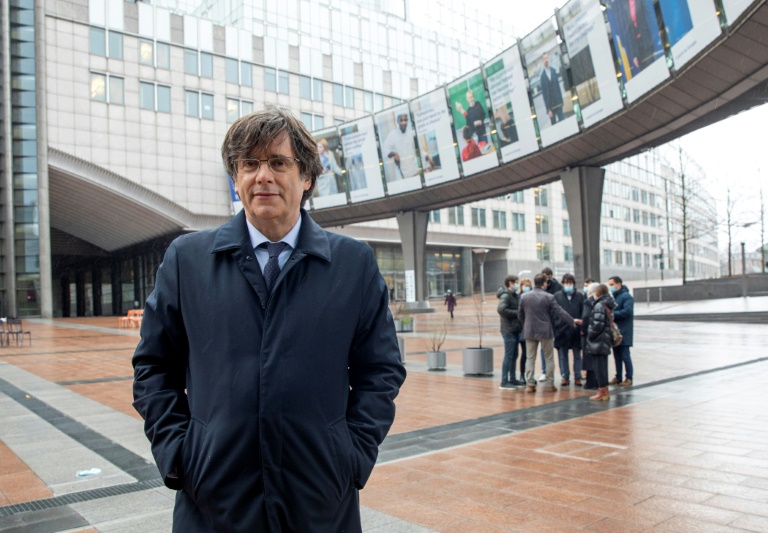Exiled former Catalan president Carles Puigdemont was awaiting a court hearing in Italy on Friday following his arrest four years after fleeing Spain over an independence referendum that Madrid ruled illegal.
The member of the European Parliament, who has been based in Belgium since late 2017, was detained in the Sardinian town of Alghero on Thursday while on his way to a cultural festival, aides said.
The 58-year-old is wanted by Madrid on charges of sedition over his attempts to lead a Catalan breakaway from Spain in October 2017, and Italian judges must now decide whether he should be extradited.
“It’s clear that Carles Puigdemont must be brought to justice and stand trial,” Spanish Prime Minister Pedro Sanchez said Friday, after the former Catalan leader spent the night in an Italian jail.
However, Puigdemont’s lawyers insist there is no basis for his arrest and say they have a “very solid” legal case.
“The first thing is to resolve his personal situation which means whether he remains in custody, whether he gets bail, or whether there is any condition for his release,” Brussels-based lawyer Gonzalo Boye told AFP.
“Then at a later stage, there will be a discussion where they will enter into the grounds (for the alleged offence)” — notably whether the arrest warrant was valid.
– Calls for his release –
Puigdemont’s arrest drew a sharp rebuke from the Catalan government, with leader Pere Aragones demanding his “immediate release” and saying he would travel to Sardinia to “stand by” the former regional leader.
It also comes at a sensitive time, nine days after the left-leaning Spanish government and regional Catalan authorities resumed negotiations to find a solution to Spain’s worst political crisis in decades.
Ahead of Friday’s hearing, supporters gathered outside the court in Sassari, a city in the north-west of Sardinia, with one holding up a large Catalan independence flag.
And in Catalonia’s regional capital Barcelona, hundreds of demonstrators gathered outside the Italian consulate, some holding makeshift signs reading “Freedom” in Catalan over Puigdemont’s picture.
Others shouted “Free our president” in Italian and waved Catalan independence flags.
The October 2017 referendum was staged by Catalonia’s separatist regional government despite a ban by Madrid and the process was marred by police violence.
Several weeks later, the separatists issued a short-lived declaration of independence, triggering a huge political crisis with Spain during which Puigdemont and several others fled abroad.
Madrid swiftly moved to prosecute those Catalan separatists that stayed behind, handing nine of them long jail terms.
Although they were all pardoned earlier this year, Madrid still wants Puigdemont and several others to face justice over the secession bid.
In March, the European Parliament rescinded immunity for Puigdemont and two other pro-independence MEPs, a decision that was upheld in July by the EU’s General Court.
However, the European Parliament’s decision is being appealed and a final ruling by the EU court has yet to be made.
“Somebody misled the (EU) General Court to lift the precautionary measures,” Boye told AFP.
– ‘Persecution’ –
Aragones, a more moderate separatist who took over as Catalan leader earlier this year, said the only solution to the region’s political crisis was “self-determination”.
“In the face of persecution and judicial repression, our strongest condemnation. It has to stop,” he wrote on Twitter.
And Quim Torra, who had taken over after Puigdemont fled, said his extradition to Spain would be “catastrophic” and urged pro-independence activists to be “on high alert”.
Meanwhile, the Catalan National Assembly, the region’s biggest grassroots separatist movement, has called people to hit the streets in protest over Puigdemont’s “illegal detention”.
Many rallies have been scheduled Friday night with another major gathering planned at midday on Sunday.
Besides Puigdemont, former Catalan regional ministers Toni Comin and Clara Ponsati are also wanted in Spain on allegations of sedition.
Madrid said it would respect the decision of the Italian courts.
“This government has respect for all judicial proceedings whether opened in Spain, in Europe or in this case in Italy, and will comply with any judicial decisions that may be taken,” Sanchez said.
The Italian government said it would not get involved. “The procedure is entirely left to the judicial authorities,” a justice ministry statement said.
burs-mg-ar/hmw/dl










